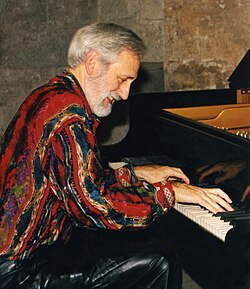| Year recorded | Title | Label | Year released | Personnel/Notes |
|---|
| 1964 | Cathexis | Columbia | 1964 | Trio, with Cecil McBee (bass), Freddie Waits (drums) [21] |
| 1964 | Carnival | Columbia | 1964 | Trio, with Charlie Haden (bass), Jerry Granelli (drums) [21] [22] |
| 1966 | Shining Hour - Live at The Trident | Columbia | 1966 | Trio, with Charlie Haden (bass), Jerry Granelli (drums); in concert; also known as Shining Hour [23] |
| 1966–1967 | Zeitgeist | Columbia | 1967 | Trio; some tracks with Charlie Haden (bass), Jerry Granelli (drums); some tracks with Joe Halpin (bass), Oliver Johnson (drums) [24] |
| 1969 | The Name of This Terrain | Now-Again | 2022 | Trio, with Mel Graves (bass, electric bass, vocals), George Marsh (drums, percussion, vocals) [25] |
| 1973 | Expansion | Double Helix | 1973 | Trio, with Mel Graves (bass, electric bass), George Marsh (drums, percussion) [26] |
| 1977 | Syzygy | 1750 Arch | 1977 | Most tracks trio, with Ratzo B. Harris (bass, electric bass), George Marsh (drums, percussion); one track quartet, with Rich Fudoli (tenor sax, clarinet, flute) added; one track quartet with Tom Buckner (vocals) added [27] [28] |
| 1978 | Invasion of the Body Snatchers | United Artists | 1978 | Soundtrack album for the 1978 film [27] |
| 1978? | Soundings | 1750 Arch | 1978 | Solo piano; some tracks in concert [29] |
| 1981 | Time Remembers One Time Once | ECM | 1983 | Duo, co-led with Charlie Haden (bass); in concert [30] |
| 1981, 1983 | Tidal Wave | Palo Alto | 1984 | Quartet, with John Abercrombie (guitar), Charlie Haden (bass), Peter Donald (drums); one track in concert [31] |
| 1986? | Homecoming | Living Music | 1986 | Solo piano [32] |
| 1988 | Trio | Windham Hill Jazz | 1988 | Trio, with Joel DiBartolo (bass, electric bass), Peter Donald (drums) [33] [34] |
| 1988–1989 | In the Moment | Windham Hill Jazz | 1989 | Most tracks duo, with David Friesen (bass); in concert; some tracks trio, with Joel DiBartolo (bass), Peter Donald (drums) [35] |
| 1992 | In Concert | ITM Pacific | 1992 | Duo, with David Friesen (bass); in concert [33] [36] |
| 1992 | Denny Zeitlin at Maybeck | Concord | 1993 | Solo piano; in concert |
| 1994 | Denny Zeitlin/David Friesen | Concord | 1995 | Duo, co-led with David Friesen (bass); in concert [33] |
| 1997 | As Long as There's Music | Venus | 1998 | Trio, with Buster Williams (bass), Al Foster (drums) [37] |
| 1998 | Live at the Jazz Bakery | Intuition | 1999 | Duo, co-led with David Friesen (bass); in concert [33] |
| 2001 | New River | Acoustic Disc | 2001 | Duo, co-led with David Grisman (Mandolin) [38] |
| 2001 | Stairway to the Stars | Sunnyside | 2014 | Trio, with Buster Williams (bass), Matt Wilson (drums); in concert [33] |
| 2003 | Slick Rock | MAXJAZZ | 2004 | Trio, with Buster Williams (bass), Matt Wilson (drums) [33] |
| 2004 | Solo Voyage | MAXJAZZ | 2005 | Solo piano, keyboards [39] |
| 2001, 2004, 2006 | Trio in Concert | Sunnyside | 2009 | Trio, with Buster Williams (bass), Matt Wilson (drums); in concert [40] [33] [41] |
| 2008 | Precipice | Sunnyside | 2010 | Solo piano; in concert [42] |
| 2009 | Wishing On the Moon | Sunnyside | 2018 | Trio, with Buster Williams (bass), Matt Wilson (drums); in concert [33] |
| 2008, 2010 | Labyrinth/Live Solo Piano | Sunnyside | 2011 | Solo piano; in concert [43] [44] |
| 2011 | Wherever You Are | Sunnyside | 2012 | Solo piano [45] |
| 2003–2004, 2011–2012 | Both/And | Sunnyside | 2013 | Solo piano, keyboards, electronics [46] |
| 2013–2014 | Riding the Moment | Sunnyside | 2015 | Duo, co-led with George Marsh (drums, percussion) [47] |
| 2014 | Early Wayne | Sunnyside | 2016 | Solo piano; in concert [33] |
| 2016 | Remembering Miles | Sunnyside | 2019 | Solo piano; in concert [33] |
| 2015–2017 | Expedition | Sunnyside | 2017 | Duo, co-led with George Marsh (drums, percussion) [48] |
| 2018 | Crazy Rhythm: Exploring George Gershwin | Sunnyside | 2023 | Solo piano; in concert [49] |
| 2014–2019 | Telepathy – Duo Electro-Acoustic Improvisations | Sunnyside | 2021 | Duo, co-led with George Marsh (drums, percussion) [50] |
| 2019 | Live at Mezzrow | Sunnyside | 2020 | Trio, with Buster Williams (bass), Matt Wilson (drums); in concert [51] |
| 2012–2023 | Panopoly | Sunnyside | 2024 | All tracks previously unreleased |
